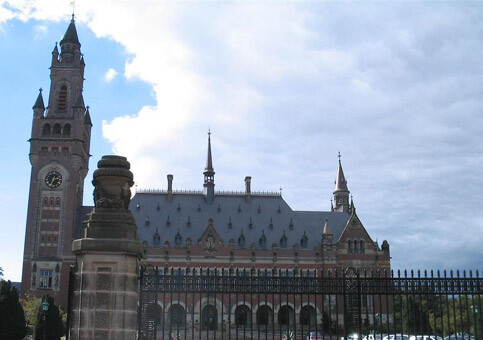Al Majdal 30 October 2004

The International Court of Justice, or the Peace Palace, in The Hague.
Israel�s construction of the separation wall in the occupied Palestinian territories and its associated regime are contrary to international law. In a non-binding advisory opinion delivered on 9 July 2004, the International Court of Justice (ICJ), the principal judicial organ of the United Nations, said Israel must cease construction of the wall and dismantle sections located in the occupied territories forthwith; repeal or render ineffective all related legislative and regulatory acts; compensate for damage caused; and, return Palestinian property or provide compensation if restitution is not possible.
Turning to the obligations of other states, the ICJ recommended that they should neither recognize the wall nor provide aid or assistance to maintain the circumstances created by its construction; prevent any impediment, created by the wall�s construction, to the exercise of the right of the Palestinian people to self-determination; and, ensure Israel�s compliance with international humanitarian law. It called on the UN to consider what further action was needed to end the illegal situation caused by the wall�s construction.
An Alternative to Oslo
The ICJ advisory opinion, one of the most important legal opinions on the question of Palestine and international peace and security in the region since the United Nations assumed responsibility for the future of the country in 1947, presents a clear alternative to the status quo � i.e., the Oslo process, the international Road Map, the Sharon disengagement plan, and, the April 2004 US letter of assurance to Israel. International law provides the foundation for this alternative.
�The situation in the Occupied Palestinian Territory (OPT) is characterized by serious violations of general international law, of human rights law and of international humanitarian law. It is not helpful to suggest that a solution can be found to the conflict in the region by ignoring norms of international law. A sustainable peace in the region must take place within the framework of international law and relevant resolutions of the United Nations.�John Dugard, UN Special Rapporteur on the situation of human rights in the Palestinian territory occupied by Israel since 1967, August 2004
The legal opinion rendered by the ICJ lays out the �driving rules� or universal standards for resolving the conflict. All parties are bound to adhere to these standards. In the event that the parties fail to do so, the Court also rendered its views on appropriate enforcement measures. Both the UN and states may take action, consistent with the Charter of the United Nations, to ensure compliance with international law.
The opinion also provides a �road map� for a comprehensive and negotiated solution to the conflict. First, the process must provide for the establishment of an independent Palestinian state. The Court reaffirmed the right of the Palestinian people to self-determination. Second, the Israeli occupation, construction of colonies and the wall in the occupied territories must cease forthwith. Conquest and annexation of territory by force breach international law. And, third, Israel must provide remedies to Palestinians whose basic rights have been violated by the construction of the wall and its associated regime. The primary remedy is restitution.
The Court reaffirmed these principles in the context of the construction of the separation wall in the 1967 occupied territories. But the legal principles apply equally to Palestinian refugees and displaced persons. Refugees must be free to exercise their individual right to self-determination � i.e., voluntary return. Under international law Israel has a responsibility to restitute and compensate all persons displaced as a result of conquest and annexation, whether it be through the construction of the wall or other means.
A Way Forward
The ICJ advisory opinion provides the international community with a clear framework for a comprehensive, just and durable peace. It is up to the Palestinian people and international civil society to transform the legal ruling into an effective tool for ending the conflict. The United States opposed the ICJ decision and will not adopt measures to enforce compliance. The EU officially remains committed to a policy of �constructive engagement� with Israel.
The international solidarity movement played a critical role in bringing an end to the apartheid regime in South Africa. The long-range impact of the ICJ opinion will similarly depend on the ability of civil society actors, Palestinian, Israeli, and others, to effectively use it as a tool for mobilization, advocacy and action. Academic, consumer, cultural, and sports boycotts, divestment and a campaign for sanctions by states must all be considered.
The implications of the status quo are apparent for all to see. More land confiscation, more settlements, more house demolitions, more casualties, a wall which will prevent the emergence of an independent Palestinian state, more refugees and internally displaced persons, and the entrenchment of an apartheid-like system of control across the West Bank and Gaza Strip.
This editorial was first published as editorial of Al Majdal (Issue No. 23, November 2004) a quarterly magazine published by BADIL Resource Center that aims to raise public awareness and support for a just solution to Palestinian residency and refugee issues. This editorial was reprinted by The Electronic Intifada with permission.
Related Links